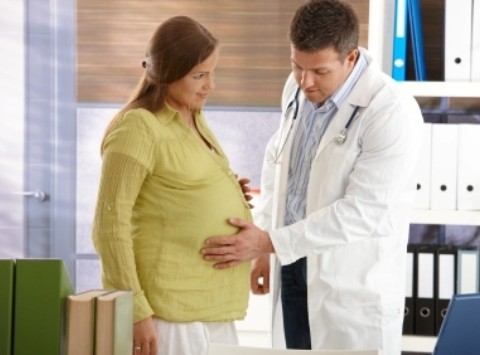When you enter the third trimester of pregnancy, you should stay in close communication with your medical provider. Prenatal appointments will occur more frequently and will include both internal and external exams to make sure that you and your child are healthy and safe. Many mothers find the third trimester particularly challenging as their physical discomfort increases while the baby continues to grow.
7 to 9 Months Pregnant & Baby Development
From the beginning of the third trimester until delivery, most babies will grow from approximately 11 inches to 20 inches. Several organs are still developing, including the brain, which is differentiating into separate regions and controlling more processes. The bones will get stronger, taste buds will develop and the baby will be able to open and close his or her eyes. You might notice that you feel a little less fetal movement as you approach your due date. Even though the baby continues to kick and shift, there will be less space to move around because of his or her rapid growth. In the ninth month, the baby’s skin will thicken, contributing as much as a ½ pound of weight per week. In the final weeks, the baby will drop down, head first, which is the ideal position for birth.

Physical Changes at the End of Pregnancy
The baby’s drop-down position will place more pressure on your bladder and might lead to frequent trips to the bathroom. On average, pregnant women gain 25 to 35 pounds over the course of their pregnancies, and might gain a pound a week in the third trimester. Several of the symptoms that you’ve been experiencing will increase. You will likely notice more back pain, varicose veins, Braxton-Hicks contractions, breast enlargement, fatigue and swelling. Sitting with good posture can ease shortness of breath caused by the expanding uterus that places pressure on your diaphragm.
Third Trimester Warnings
Doctors can check for illnesses, such as Group-B strep, that cause complications with delivery. If you feel pain during urination, intense cramps, disorienting dizziness or experience an inordinate amount of weight gain, head straight a medical facility, as these can indicate serious pregnancy complications. If bleeding occurs during this stage, you might need a C-section because of a condition called placenta previa (placenta blocking the uterus). Once you reach 37 weeks, the baby is considered full-term and ready for delivery. Going into labor before this point is classified as pre-term. By the third trimester, the baby has a good chance of survival, but might need extensive medical care if he or she delivers before 37 weeks.